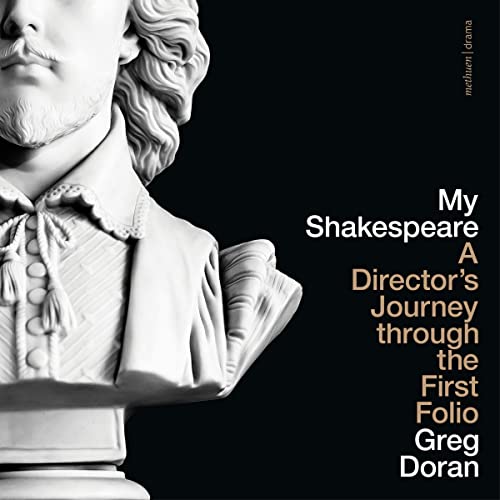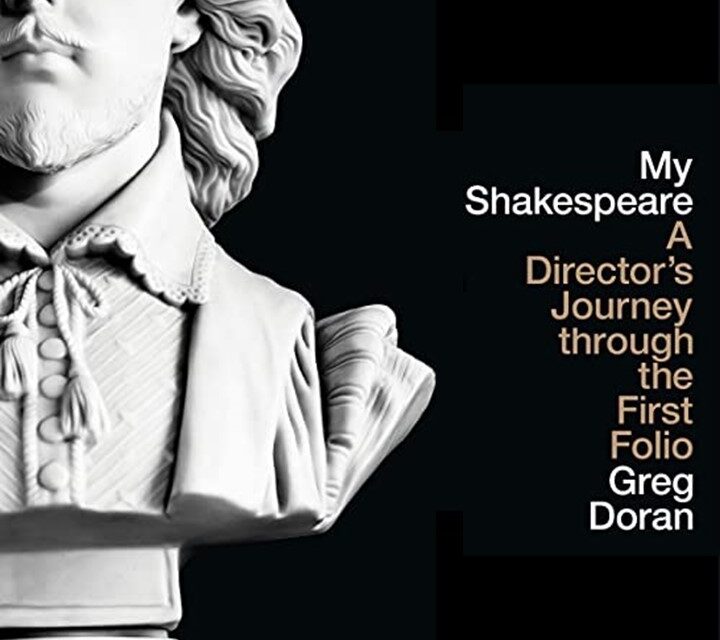
My Shakespeare: A Director’s Journey through the First Folio
by Greg Doran (Methuen Drama hardback)
Review by Andrew Hilton, June 2023
Greg Doran joined the Royal Shakespeare Company as an actor in 1987 at the age of 29, following a degree in English and Drama at the University of Bristol, actor-training at the Bristol Old Vic Theatre School and a period both acting and directing at the Nottingham Playhouse. But it was not long before the RSC suggested that he continue with the company as director rather than actor. So began a 35-year association with the company in that role, from 2012 to 2022 as its sixth Artistic Director. My Shakespeare: A Director’s Journey through the First Folio is an account of that life, part diary, part recollection. As I know from my own experience on a far humbler stage, it is an enormous privilege to live in and alongside that great body of work, to explore and learn from it, to find it so astonishingly illuminating about events in our own time. The strength of this book is that Shakespeare provides the medium in which Doran weaves together the professional, the personal and the political on almost every page.
The personal/professional thread is particularly telling as Doran’s partner – and from 2015 his husband – was Antony Sher, the leading actor whose untimely death from cancer in 2021 probably contributed to Doran’s decision to resign as Artistic Director a few months later. Sher was a celebrated Richard III in the 1984 production by Bill Alexander, and later played Titus, Shylock, Macbeth, Lear and Falstaff in Doran’s own productions. They also travelled together, sometimes in search of the worlds of Shakespeare’s plays – to Egypt, and to Hisarlik in Turkey, which Heinrich Schliemann declared to be the site of ancient Troy – though Doran is frank about the usefulness of these trips:
‘There is probably about as much point sailing down the Nile in order to understand Shakespeare’s inspiration in writing Antony and Cleopatra, as there would be heading to Milford Haven to better comprehend the complexities of Cymbeline.’
But he proves an accomplished travel writer with a fine eye for detail. And there are other equally rich moments away from the rehearsal room: among them, a meeting with Nelson Mandela, dancing on the stage of the Festival Hall with Desmond Tutu (‘one of the happiest experiences of my life’), and ten days on a beach in St Lucia discussing a new stage version of The Odyssey with its author, Derek Walcott. The RSC opened many such doors and Doran walked through them with relish.
But running an organisation of the RSC’s size, complexity and international reputation inevitably involves moments, and sometimes longer periods, of crisis. Doran writes sympathetically of Adrian Noble’s painfully difficult last days as the company’s fourth Artistic Director, and movingly of his own experience having to close the theatre – ending a record of performance that had remained almost unbroken for 140 years – when Covid 19 struck. He mourns the abandoned 2020 plans for The Comedy of Errors and The Winter’s Tale, recounts the company’s attempt to maintain full employment, then the advent of the second lockdown and the impossibility of avoiding a number of redundancies. Again, the detail is expressive, as when he notes that he can hear the ticking of the clock in the Elizabeth Scott Bar, normally completely inaudible beneath the excited chatter of the audience.
Every chapter-heading is a Shakespeare play – every play in the Folio has a chapter – and many are examined in detail, Doran just occasionally falling back on merely telling the story. From most of the judgements I would not demur. That Lady Macbeth’s famous faint, so often played as a ruse, is real; that Katherina before her encounter with Petruchio is a young woman ‘in pain’ (rather than the free spirit of tradition); that Lear does not have dementia; that Duke Vincentio’s ‘Be absolute for death’ speech is loaded with ‘personal despair, a lonely emptiness’; and that it is hugely important to keep open the possibility of alternative outcomes (the ‘crossroads’ in the texts Doran calls them) – these are all arguments I have made myself. And his frequent sense of loss in the ‘inflation’ of a production from the rehearsal room to the full stage will be echoed by many others in the theatre who have witnessed those sometimes unhappy transitions. All these arguments are eloquently expressed. With the RSC’s resources behind him they are also well researched. I had never learned that the tiny but telling part of Cinna the Poet in Julius Caesar (which I played myself at the NT in 1977) had been lost from the stage for centuries before it was restored in the 1930s. And though I was well aware that many Elizabethans viewed fairies as threatening rather than as the sweetly charming wraiths of the Victorian imagination, I did not know this detail:
‘in Shakespeare’s day they believed that between midsummer’s night and the feast of St Peter and St Paul [about a week later], a portal opened up between the fairy world and our own, and you needed to take especial care your children were not snatched away by sprites and replaced with logs …’
– a belief that adds an extra charge to four lovers’ experience in the Athenian forest on a midsummer night.
There are some interesting speculations. The idea, now promoted by some academics, that one of Shakespeare’s company’s boys might have been black, and therefore cast as the ‘black as ebony’ Rosaline in Love’s Labour’s Lost and perhaps as Cleopatra, is fine food for thought (and further research). Less so is an idea about King Lear. Did Shakespeare really set out to end that play with the victory of Lear and Cordelia? For Doran, the Covid pandemic, with its terrible death toll and the consequent closure of the theatres, echoed Shakespeare’s experience in 1604 when fifteen percent of the population of London perished by the plague, a disaster that he suggests prompted Shakespeare to a change of mind mid-composition. Such a simple equation – rather like the commonly held dementia theory – seems to me to diminish this greatest of plays.
And his contention, when talking of Shakespeare’s portrayal of the twins Viola and Sebastian in Twelfth Night, that:
‘There are of course double the sets of twins in The Comedy of Errors, but none of them know of the other’s existence, so they feel no pain in their separation. Viola and Sebastian ache with it, and their reunion is the more touching because of it.’
is just plain wrong. In a play often and mistakenly denied any emotional depth, Antipholus of Syracuse eloquently expresses his sense of loss:
‘I to the world am like a drop of water
that in the ocean seeks another drop,
who, falling there to find his fellow forth,
unseen, inquisitive, confounds himself.
So I, to find a mother and a brother,
in quest of them, unhappy, lose myself.’
An odd error, to add to the play’s own, given that Doran had played Antipholus himself, albeit for a company he created as a schoolboy.
But there are insights a-plenty to overweigh my cavils, and some enormous achievements outside the rehearsal room: among them, a collaborative project to translate all the plays into Mandarin Chinese, following the company’s first visit to China in 2016; and, following the NT’s lead, his 2013 decision to film and live-stream every production. At last we were to have a national theatre!
Though towards the end of the RSC years he sought the newly fashionable gender balance in casting – his 2018 Troilus & Cressida saw Ulysses, Aeneas, Agamemnon, Calchas, Antenor and Thersites all played by women – and earlier he had transposed Julius Caesar from Italy to Africa, Doran was no revolutionary. He tried to live by Rudi Shelley’s ‘Rule Number One: don’t want to be clever’. Rudi Shelley was the legendary acting tutor at the Bristol Old Vic Theatre School, a German Jewish refugee who had taught at the school since it opened in 1946. Doran acknowledges his immense debt to him as he does later to RSC director John Barton and the company’s voice coach, Cicily Berry. He interprets Rudi’s rule as ‘a reminder not to get in between the audience and the play’. He evidently succeeded in this in the main and has been rightly celebrated for it. There was the odd blip. In 2000 he rather eccentrically chose the celebrated Californian textile artist Kaffe Fassett to design As You Like It in conjunction with Niki Turner. Despite an admired Rosalind from Alexandra Gilbreath, the production received ‘a resounding thumbs down’ from the critics, for reasons Doran does not divulge. Was it perhaps that Fassett’s ‘riot of colour’ did get between the audience and the play? I would love to have heard more.
He opens the chapter on his 2003 The Taming of the Shrew with the pithily accurate: ‘Directors do not so much direct The Taming of the Shrew as try to solve it.’ And, as one feels it must, the book charts his encounter with that particular hard nut, as well as with Othello and The Merchant of Venice, plays in which accusations of racial stereotyping and prejudice have to be addressed. In the case of The Taming he begins well enough; he wins the RSC Board’s approval to pair the play with John Fletcher’s The Tamer Tamed, the 1609 riposte to Shakespeare’s play in which the widowed Petruchio’s second wife turns the tables on him. And then early in rehearsal his Petruchio, Jasper Britton, develops an idea of his character as ‘a volatile neurotic’ who has only recently lost his father and is drinking away his inheritance in grief and bewilderment. In their first encounter Petruchio and Katherina momentarily find a real connection – Doran neatly records how Shakespeare’s alternating use of the ‘thou/thy’ and ‘you/your’ can support this – a connection that is normally only achieved in Act Four. This is all promising, but ultimately nothing can save the relationship from the cruel bullying that Petruchio employs to ‘tame’ his new wife when he has taken her home to Verona. This is not to censure Doran for engaging with the play (I have directed it myself and made no apology) but its place on our stage is questionable, and nothing Doran records here suggests his own attempt to ‘solve it’ – to reimagine or excuse that terrible bullying – met with success. At least he did not try to bend the text, as did a later RSC production, to render it a satire on male chauvinism; Doran is too dedicated and too honest a Shakespearean to do that.
But an even more difficult problem, in my view, is The Merchant of Venice. I have played in it myself (Bassanio in a British Council tour over 40 years ago) but at the Tobacco Factory I decided my company would not perform it. This is a play in which gentiles spit on the Jewish money-lender, Shylock, and the verdict of the Venetian state after he is thwarted in his demand for a pound of Antonio’s flesh is that he must convert to Christianity, or lose his life.
Shakespeare speaks up well for Shylock in his famous ‘Hath not a Jew eyes?’ speech, but is this enough? A number of Jewish actors have thought so and have played Shylock themselves. Indeed it is probably as essential now that a Jewish actor is cast as Shylock, as that an actor of African or Arab descent is cast as Othello. And for gentile directors who wish to stage the play a Jewish Shylock heading the cast seems to validate their intent.
Doran has had three encounters with the play. He played Solanio when he first joined the RSC in 1987, a production in which Antony Sher played Shylock. He then directed it in 1997 with Philip Voss as Shylock and then again in Japan, in Japanese, with a Japanese cast. Doran notes that in 1987 Sher had unsuccessfully advocated cutting the whole of Act Five, the sequence that follows the end of the trial and Shylock’s punishment. Others have made the same proposal. This is the point, I think. While it is possible to make the gentiles’ anti-semitism all too obvious and obnoxious – to up the spit-quotient, as it were – what is inescapable is that Act Five, its comedy of the rings and the celebrations of the marriages of Bassanio with Portia, Gratiano with Nerissa, and Lorenzo with Shylock’s apostate daughter, Jessica, confirms that this play is at heart a romantic comedy, from which the Jewish Shylock and the African Prince of Morroco (so much less is written of Portia’s casual anti-black racism) can be comfortably excluded. Shakespeare has the imagination and the empathy to feel for Shylock, to the extent of giving him a great and persuasive speech, but his world did not have the same horror of racism as we have and he can forgive what to us is unforgiveable.
Doran remains largely silent on this, saying only in response to Sher’s request for the cut: ‘I happen not to agree with him’. For a second time, I wished to hear more, a real argument from this man who has thought so deeply and so long about these plays for the retention of this play in the repertoire. That even the Royal Shakespeare Company must do a play because it is Shakespeare’s – if that is what successive RSC directors have believed – is just not enough.
 Review by Andrew Hilton, June 2023
Review by Andrew Hilton, June 2023
Andrew Hilton founded Shakespeare at the Tobacco Factory in 1999 and remained its Artistic Director until 2017. He is the author of Shakespeare on the Factory Floor (Nick Hern Books 2022)


